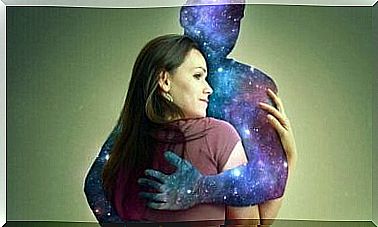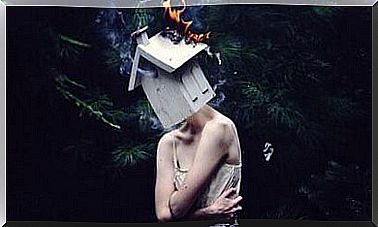When Anxiety Takes Over, You Stop Being Yourself

When anxiety takes over our reality, everything changes, everything dissolves and dissolves. Because anxiety is like that uncomfortable guest who takes advantage of us, who refuses to leave when we ask and messes up. When this happens, our personality changes and we lose potential, balance and well-being.
It is worth noting that, from the psychological point of view, human beings are skilled specialists in transforming ‘beautiful’ into ‘beast’. What does that mean? Anxiety itself is not our enemy, we are the ones who turn it into an uncomfortable monster that devours calm and eats away at health.
This dimension, when well controlled and calibrated in our favor, becomes an excellent ally. It allows us to react to threats, gives us momentum, motivation, the ability to conquer, etc.
However, there is another obvious problem whereby anxiety ends up taking the form of our worst enemy.
Our society is an ideal setting for shaping anxious profiles. Anxiety thrives in conditions of uncertainty, and today the world is full of potential threats big and small that we cannot control.
On the other hand, there is a striking fact: our society, in a way, also rewards anxious behavior.
Being busy and preoccupied, having a busy schedule, or doing five things at once is normal and even desirable. Those who do not have this standard of living are labeled as lazy or carefree.
Let’s get one thing straight: Empowering anxiety has serious side effects. Living on autopilot guided by this dimension is not living, it’s just surviving.

What happens when anxiety takes over?
Robert Edelmann, emeritus professor of forensic and clinical psychology at the University of Roehampton in London, says something interesting in his book Anxiety: Theory, Research and Intervention in Clinical and Health Psychology ( Anxiety: Theory, Research and Intervention on Clinical Psychology in free translation).
Anxiety itself is not a psychological anomaly and even less a disease. It’s just another process of human functioning, something normal. The only problem is that human beings have become used to misusing it.
We cannot spend entire months, years and decades building up tensions, fears and worries. Certain unexperienced experiences, a lifestyle marked by continual stress, and even negative self-talk are factors that make this pressurized environment in which air is not released but dangerously accumulated, more intense.
However, far from causing an explosion, this incendiary material enters us and every particle of our being, transforming us. That’s what happens when anxiety takes over.
You stop trusting yourself and start sabotaging yourself
Anxiety makes us someone who goes against our own expectations. Little by little, the mental point of view becomes more negative, even becoming our own boycott mechanism.
Any idea that crosses our minds will be challenged by that anxiety-modulated inner voice.
The goals, desires and plans for the future will also be objects of criticism in front of which anxiety whispers at every moment that it is not worth it, that we are going to fail again and again.
It also doesn’t matter that you’ve worked hard to accomplish a particular task or project. In the end, you’ll doubt yourself so much that you’ll end up discarding any ideas.
Personal relationships lose quality
When anxiety takes over our brain and our lives, it ultimately undermines valuable relational tissue. A mind that is always busy tends to neglect, almost unintentionally, those who matter most.
She does this because she has difficulty detecting the needs of others when the person feels anguish, pressure and discomfort.
It’s hard to maintain a close, optimistic, well-resolved character when what’s going on inside is an emotional storm. All of this, without a doubt, causes family ties to be lost and various problems arise.
On the other hand, social relationships also lose strength. It is very difficult to maintain friendships or make new friends when anxiety is within us.

When anxiety takes over, nothing else is interesting
A person suffering from anxiety acts out of inertia: he goes to work and comes home. Hold conversations in which you just talk, respond, smile, and be silent.
He continues to carry out those activities that he used to enjoy, pretends to have fun and even appears to be a little happy. However, he ends up returning home with a great feeling of emptiness.
Anxiety disorders flood our brain and body through norepinephrine and cortisol. These hormones basically limit us to staying alert, keeping us in survival mode.
It is impossible, therefore, for us to be able to enjoy something or relax, because in the anxious brain there is no room for serotonin and endorphins.
All of this causes us to end up becoming unknown to ourselves. We come to appreciate practically nothing, and nothing seems to have meaning. Little by little, we navigate this existential void, in which anxiety sets the course and also chaos. We must not allow this.
These situations cannot be allowed to elongate over time, because the psychological and physical strain is enormous.
We should not, therefore, hesitate to ask for help. Anxiety disorders are not fought with antidotes, but with strategies and new mental approaches that we can all learn to put into practice.









